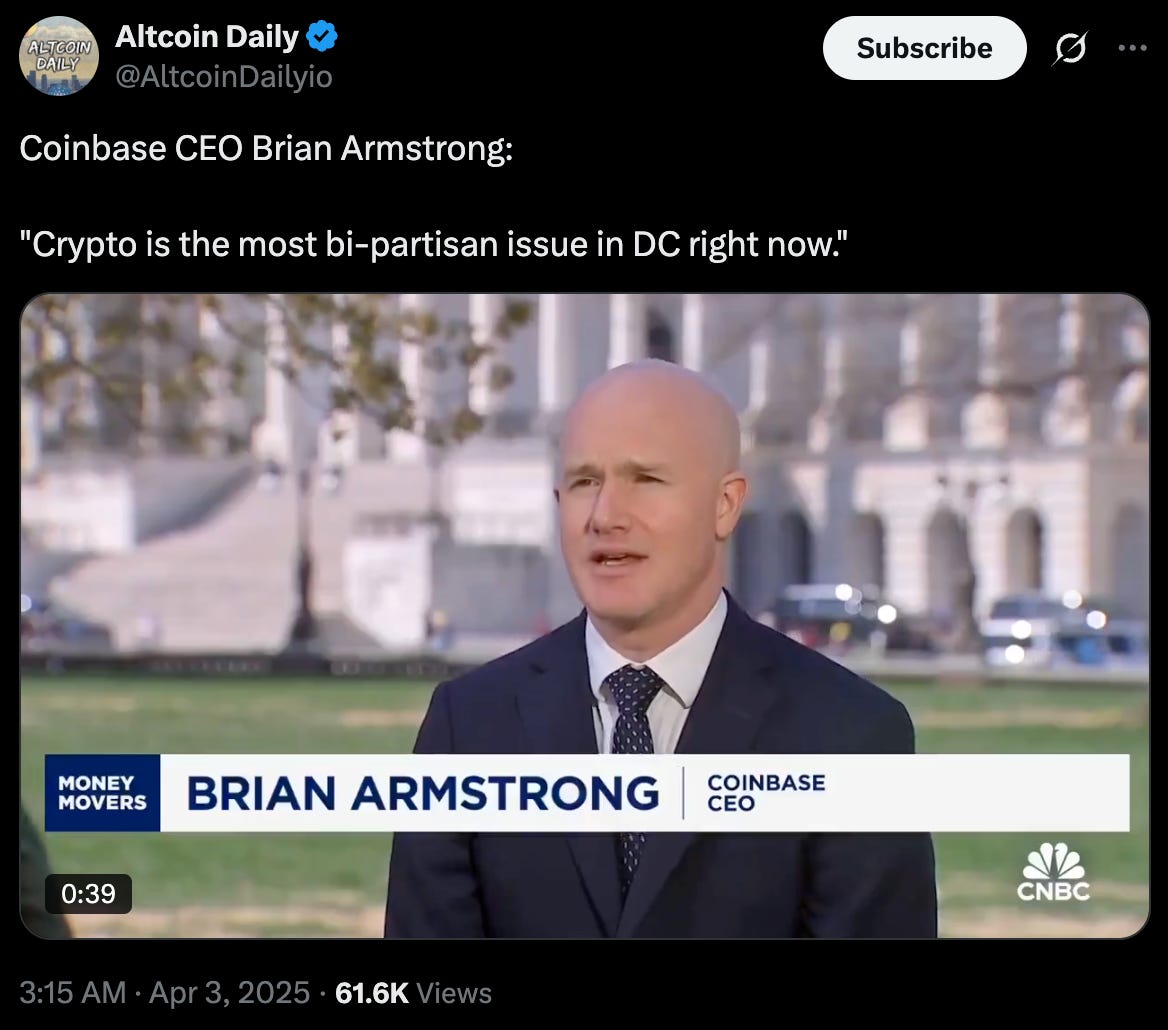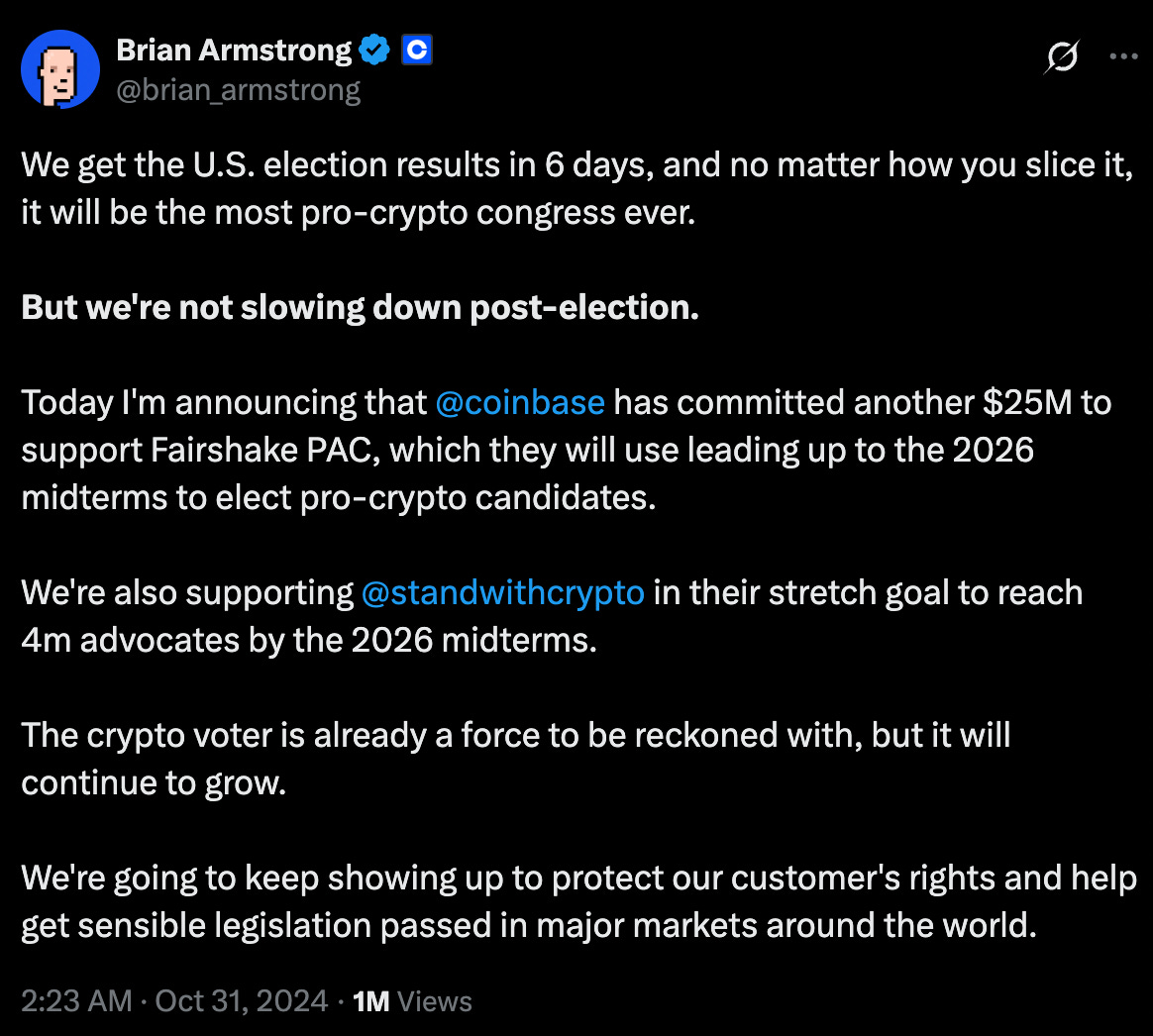TGIF Dispatchers.
At a Senate Banking Committee hearing this week, Coinbase CEO Brian Armstrong made an unexpected request.
He asked Congress to allow stablecoin companies to pay interest to users – a seemingly technical change that could fundamentally reshape the relationship between crypto and traditional finance.
"Many Americans are earning about 0.14% in their savings account, but in Treasurys, you can earn 4.5% right now," Armstrong explained. "That seems unfair to me."
The moment captured what makes Armstrong distinctive in crypto's leadership landscape: a quiet but persistent voice pushing the boundaries of financial systems through technical innovation rather than bombastic proclamations.
As the founder of America's largest cryptocurrency exchange, Armstrong has transformed from a software engineer with payment frustrations to a political power broker whose influence is reshaping not just crypto regulation, but American politics itself.
His journey reflects the complex evolution of cryptocurrency from outsider technology to mainstream financial asset – and the tension between revolutionary ideals and practical compromise that defines its future.
Special Deal for Traders: Big Funds, Bigger Profits!
Tired of trading small? What if you could trade with serious capital — without risking your own? That’s where Propexito comes in.
Here’s the deal
Pass the challenge & prove you’ve got the skills
Get funded and trade with Propexito’s capital
Keep up to 90% of your profits—because you earned it
TTD exclusive: 20% off your challenge with code TTD20
No more excuses. No more small trades. Just pure profit potential.
Grab your 20% discount & start trading with Propexito!
Silicon Valley Origins
Born on January 25, 1983, in San Jose, California, Brian Armstrong grew up in a household where technology was familiar territory. Both his parents were engineers, providing an early environment that nurtured his technical curiosity.
After attending Bellarmine College Preparatory, a Catholic all-male secondary school, Armstrong headed to Rice University in Texas, where his academic path revealed his dual interests – earning a bachelor's degree in both computer science and economics in 2005, followed by a master's in computer science in 2006.
Armstrong's entrepreneurial drive emerged during university, in 2003, when he co-founded UniversityTutor.com, an online platform connecting students with tutors. He ran the company remotely while spending time in Buenos Aires, Argentina – an experience that gave him firsthand exposure to a country battling hyperinflation and financial instability.
After graduation, Armstrong built a solid foundation in software engineering and financial systems. He worked as a developer at IBM, served as a consultant at Deloitte, and eventually landed at Airbnb in 2011, where he focused on fraud prevention and global payments.
At Airbnb, Armstrong encountered the friction points in global payment systems firsthand, as the company was moving money across 190 countries.
These frustrations, combined with his discovery of Satoshi Nakamoto's Bitcoin whitepaper in 2010, planted the seeds for what would become his most significant venture.
Get 17% discount on our annual plans and access our weekly premium features (HashedIn, Wormhole, Rabbit hole and Mempool) and subscribers only posts. Also, show us some love on Twitter and Telegram.
The Coinbase Journey
In 2012, Armstrong took a decisive step – quitting his job at Airbnb to pursue a vision of making cryptocurrency accessible to everyday users. He applied to Y Combinator, the prestigious startup accelerator, but was told he needed to find a co-founder within three days to proceed.
Armstrong's solution was practical and direct: he posted on Hacker News seeking a co-founder who shared his interest in creating a user-friendly Bitcoin platform.
The post connected him with Fred Ehrsam, a Goldman Sachs trader with a similar outlook on cryptocurrency's potential. Together, they secured a $150,000 investment from Y Combinator.
Coinbase launched in October 2012 from a modest two-bedroom shared apartment.
The company's first product was a Bitcoin wallet called "Toshi" – named after Bitcoin creator Satoshi Nakamoto (and coincidentally, one of Armstrong's cats).
From those humble beginnings, Armstrong built Coinbase into America's premier cryptocurrency exchange. The company's growth trajectory has been remarkable:
By 2018, a funding round valued Coinbase at $8.1 billion
In April 2021, Coinbase went public via direct listing on NASDAQ, briefly reaching a market capitalisation of $100 billion
Today, Coinbase operates in over 100 countries, serving more than 100 million verified users
Armstrong's leadership approach at Coinbase has been characterised by a focus on mainstream accessibility, regulatory compliance, and disciplined execution.
In September 2020, Armstrong published a blog post titled "Coinbase is a mission focused company," articulating his philosophy of maintaining an apolitical workplace focused solely on the company's goals.
He established that Coinbase would not engage in broader societal issues unrelated to the core business, debate causes or political candidates internally, or expect the company to represent employees' personal beliefs externally.
The policy was divisive, with critics arguing it was impossible to separate politics from financial technology that has inherent regulatory and political dimensions. Following the announcement, approximately 60 employees (about 5% of staff at the time) left the company after Armstrong offered severance packages to those uncomfortable with the policy.
Despite the controversy, Armstrong's focus on the company's core mission helped Coinbase survive multiple crypto market cycles and regulatory challenges, including a landmark lawsuit from the SEC that was dropped in early this year.
The Political Evolution
Then comes his transformation from apolitical tech executive to one of the most influential political actors in the cryptocurrency space.
Armstrong has emerged as a bipartisan force in Washington, making strategic political contributions to candidates from both major parties in recent years.
He has donated to Republican committees such as John Thune's joint fundraising committee ($41,300), Cynthia Lummis's committee, and Timothy Scott's committee. At the same time, he has funded Democratic campaigns including those for Yadira Caraveo, Steven Horsford, Katherine Clark, and Josh Gottheimer.
When asked about his political strategy on CNBC this week, Armstrong explained: "Crypto is the most bipartisan issue in DC right now. We have support from both sides of the aisle, and we're working with everyone who understands the potential of this technology."
Armstrong's political influence extends beyond personal contributions. Coinbase has been a major force behind two significant political initiatives:
Fairshake, a super PAC (Political Action Committee) that supports candidates favourable to the cryptocurrency industry. Coinbase has committed nearly $100 million to Fairshake, including a recent additional pledge of $25 million for the 2026 midterm elections.
Read: Crypto Goes Big On US Elections 🎈
Stand With Crypto, an advocacy group initiated by Coinbase to mobilise crypto voters and track candidates' positions on crypto issues. The group provided information on candidates' crypto-related stances during the 2024 election and tracked election results for crypto-friendly candidates.
These efforts paid substantial dividends in the 2024 US election. Armstrong declared the results "a huge victory for the crypto industry," with 257 pro-crypto candidates elected to the House of Representatives according to his count. Stand With Crypto reported even higher numbers: 267 pro-crypto candidates in the House and 18 in the Senate.
Armstrong had a direct phone call with President-elect Donald Trump, discussing the cryptocurrency industry broadly – a remarkable demonstration of his growing political influence.
Critics have been quick to point out the contradiction — you can't claim to be "apolitical" while simultaneously becoming one of the largest political donors in an industry.
The 180-degree turn has left many questioning whether his apolitical stance was ever genuine or just convenient positioning until regulatory threats forced his hand into the very political arena he once claimed to avoid.
The Industry Advocate
Armstrong's role as an industry advocate has been particularly evident in his battles with regulators, most notably the SEC under former Chair Gary Gensler.
In 2023, the SEC filed a lawsuit against Coinbase, alleging that the company operated as "an unregistered national securities exchange, broker, and clearing agency." Armstrong reported that Coinbase spent approximately $50 million fighting this case.
In early 2025, under the new Trump administration, the SEC agreed to drop the lawsuit with prejudice, meaning it cannot be refiled – a development Armstrong described as "hugely vindicating."
Throughout these regulatory challenges, Armstrong has maintained a consistent message: the need for clear, sensible regulations that protect consumers without stifling innovation. This approach has positioned him as a mature industry voice advocating for constructive engagement with regulators rather than outright rejection of oversight.
His most recent advocacy for interest-bearing stablecoins highlights this practical approach. Rather than challenging securities laws directly, Armstrong is working through legislative channels to create specific exemptions that would enable stablecoins to function more like traditional savings accounts.
"Stablecoins should be able to pay interest just like an ordinary savings account, without the onerous disclosure requirements and tax implications imposed by securities laws," Armstrong argued.
This position puts him at odds with language in current proposed stablecoin legislation, both the House's STABLE Act and the Senate's GENIUS Act, which specify that stablecoin issuers may not pay interest to users.
The controversy centres on whether paying interest would subject stablecoins to securities laws under the Howey Test, which classifies investments as securities if they involve an expectation of profit from others' efforts.
Beyond Coinbase
Despite his central role at Coinbase, Armstrong has pursued several initiatives beyond the exchange, revealing broader interests and ambitions.
In 2018, he founded GiveCrypto.org, a nonprofit organisation with a mission to distribute cryptocurrency directly to people in need around the world. The organisation aims to help people in need through direct cash transfers using cryptocurrency, advance real-world usage of cryptocurrency, and provide universal access to an open financial system.
That same year, Armstrong signed the Giving Pledge, committing to donate the majority of his wealth to charitable causes throughout his lifetime – joining the ranks of billionaires like Bill Gates and Warren Buffett who have made similar commitments.
His entrepreneurial interests extend beyond cryptocurrency as well. He co-founded ResearchHub, a platform aimed at accelerating scientific research by incentivising open collaboration, and in 2023, he co-founded NewLimit, a bioengineering startup specialising in epigenetic cell reprogramming with the goal of extending human health span.
Armstrong has also expressed some unconventional views on governance and the future of nation-states. He has stated that the United States is in "slow decline" and has embraced the Network State political movement popularised by former Coinbase CTO Balaji Srinivasan. This concept envisions creating new forms of governance beyond traditional nation-states, potentially using blockchain technology as a foundation.
Token Dispatch View 🔍
Brian Armstrong's evolution from software engineer to crypto kingmaker offers a compelling window into how cryptocurrency is reshaping both finance and politics.
These activities reveal a figure whose interests and influence extend well beyond cryptocurrency – spanning philanthropy, science, longevity research, and political theory about the future of governance itself.
Unlike many crypto founders who embrace provocative rhetoric and rebel against traditional systems, Armstrong has pursued a more pragmatic path – building bridges between crypto innovation and existing financial infrastructure while working methodically to reshape the regulatory landscape.
At the same time, Brian Armstrong's career presents contrasting approaches that reflect the broader tensions within the cryptocurrency ecosystem.
On one hand, Armstrong has positioned Coinbase as an apolitical company, and this stance resulted in employee departures and criticism that such separation is artificial in an industry with inherent political dimensions.
On the other hand, Armstrong himself has become increasingly political, directing substantial resources toward influencing election outcomes and regulatory frameworks. Through bipartisan political contributions and initiatives like Fairshake PAC and Stand With Crypto, he has actively shaped the political landscape around cryptocurrency.
This apparent contradiction raises questions about the relationship between stated principles and practical actions. Is Armstrong's company-level apolitical stance primarily about workplace efficiency, while his external political engagement reflects pragmatic recognition that regulatory outcomes determine market access? Or does it represent a fundamental inconsistency in approach?
The contrast extends to his vision for cryptocurrency itself. Armstrong advocates for integration with existing financial systems through proper regulation, while simultaneously expressing interest in the Network State concept — a vision that imagines new forms of governance potentially supplanting traditional nation-states. These positions sit in tension: one seeks to work within existing structures while the other envisions their eventual replacement.
Armstrong's navigation of these contradictions makes him a case study in how the cryptocurrency industry is maturing. The idealism of crypto's early days has increasingly confronted practical realities of operating within existing legal frameworks, requiring figures like Armstrong to balance revolutionary potential with evolutionary implementation.
What's clear is that Armstrong's quiet persistence has established him as one of the most consequential figures in cryptocurrency's still-unfolding story – not through bombastic proclamations, but through methodical building of both technology and influence.
Token Dispatch is a daily crypto newsletter handpicked and crafted with love by human bots. You can find all about us here 🙌
If you want to reach out to 200,000+ subscriber community of the Token Dispatch, you can explore the partnership opportunities with us.
Fill out this form to submit your details and book a meeting with us directly.
Disclaimer: This newsletter contains sponsored content and affiliate links. All sponsored content is clearly marked. Opinions expressed by sponsors or in sponsored content are their own and do not necessarily reflect the views of this newsletter or its authors. We may receive compensation from featured products/services. Content is for informational purposes only, not financial advice. Trading crypto involves substantial risk - your capital is at risk. Do your own research.













